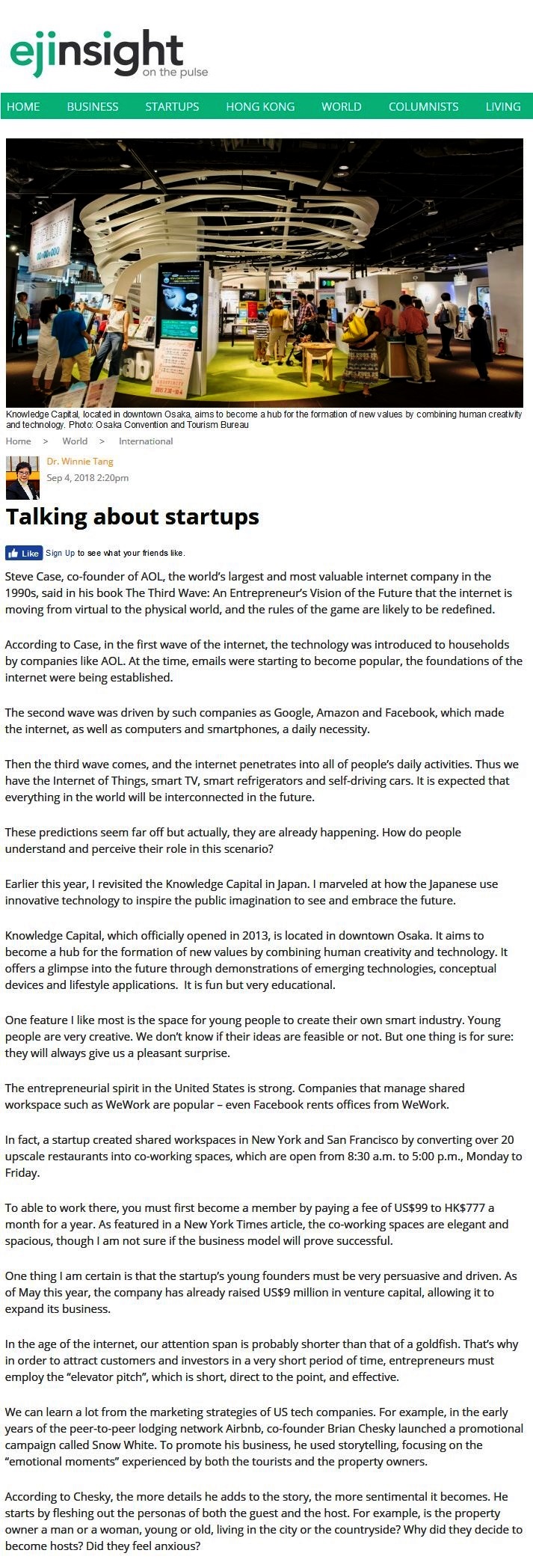網上版請按此

Talking about startups
Steve Case, co-founder of AOL, the world's largest and most valuable internet company in the 1990s, said in his book The Third Wave: An Entrepreneur's Vision of the Future that the internet is moving from virtual to the physical world, and the rules of the game are likely to be redefined.
According to Case, in the first wave of the internet, the technology was introduced to households by companies like AOL. At the time, emails were starting to become popular, the foundations of the internet were being established.
The second wave was driven by such companies as Google, Amazon and Facebook, which made the internet, as well as computers and smartphones, a daily necessity.
Then the third wave comes, and the internet penetrates into all of people's daily activities. Thus we have the Internet of Things, smart TV, smart refrigerators and self-driving cars. It is expected that everything in the world will be interconnected in the future.
These predictions seem far off but actually, they are already happening. How do people understand and perceive their role in this scenario?
Earlier this year, I revisited the Knowledge Capital in Japan. I marveled at how the Japanese use innovative technology to inspire the public imagination to see and embrace the future.
Knowledge Capital, which officially opened in 2013, is located in downtown Osaka. It aims to become a hub for the formation of new values by combining human creativity and technology. It offers a glimpse into the future through demonstrations of emerging technologies, conceptual devices and lifestyle applications. It is fun but very educational.
One feature I like most is the space for young people to create their own smart industry. Young people are very creative. We don't know if their ideas are feasible or not. But one thing is for sure: they will always give us a pleasant surprise.
The entrepreneurial spirit in the United States is strong. Companies that manage shared workspace such as WeWork are popular – even Facebook rents offices from WeWork.
In fact, a startup created shared workspaces in New York and San Francisco by converting over 20 upscale restaurants into co-working spaces, which are open from 8:30 a.m. to 5:00 p.m., Monday to Friday.
To able to work there, you must first become a member by paying a fee of US$99 to HK$777 a month for a year. As featured in a New York Times article, the co-working spaces are elegant and spacious, though I am not sure if the business model will prove successful.
One thing I am certain is that the startup's young founders must be very persuasive and driven. As of May this year, the company has already raised US$9 million in venture capital, allowing it to expand its business.
In the age of the internet, our attention span is probably shorter than that of a goldfish. That's why in order to attract customers and investors in a very short period of time, entrepreneurs must employ the "elevator pitch", which is short, direct to the point, and effective.
We can learn a lot from the marketing strategies of US tech companies. For example, in the early years of the peer-to-peer lodging network Airbnb, co-founder Brian Chesky launched a promotional campaign called Snow White. To promote his business, he used storytelling, focusing on the "emotional moments" experienced by both the tourists and the property owners.
According to Chesky, the more details he adds to the story, the more sentimental it becomes. He starts by fleshing out the personas of both the guest and the host. For example, is the property owner a man or a woman, young or old, living in the city or the countryside? Why did they decide to become hosts? Did they feel anxious?
Dr. Winnie Tang
Honorary Professor, Department of Computer Science, The University of Hong Kong